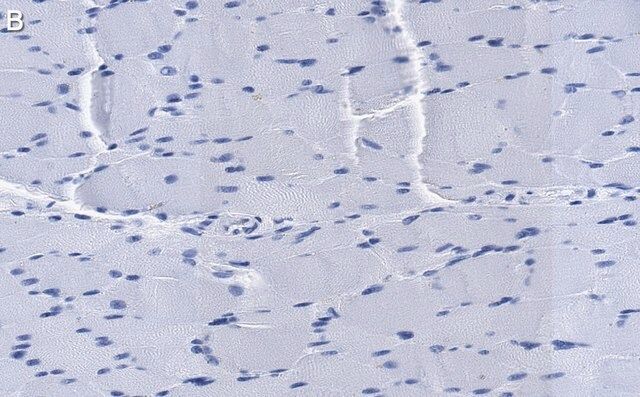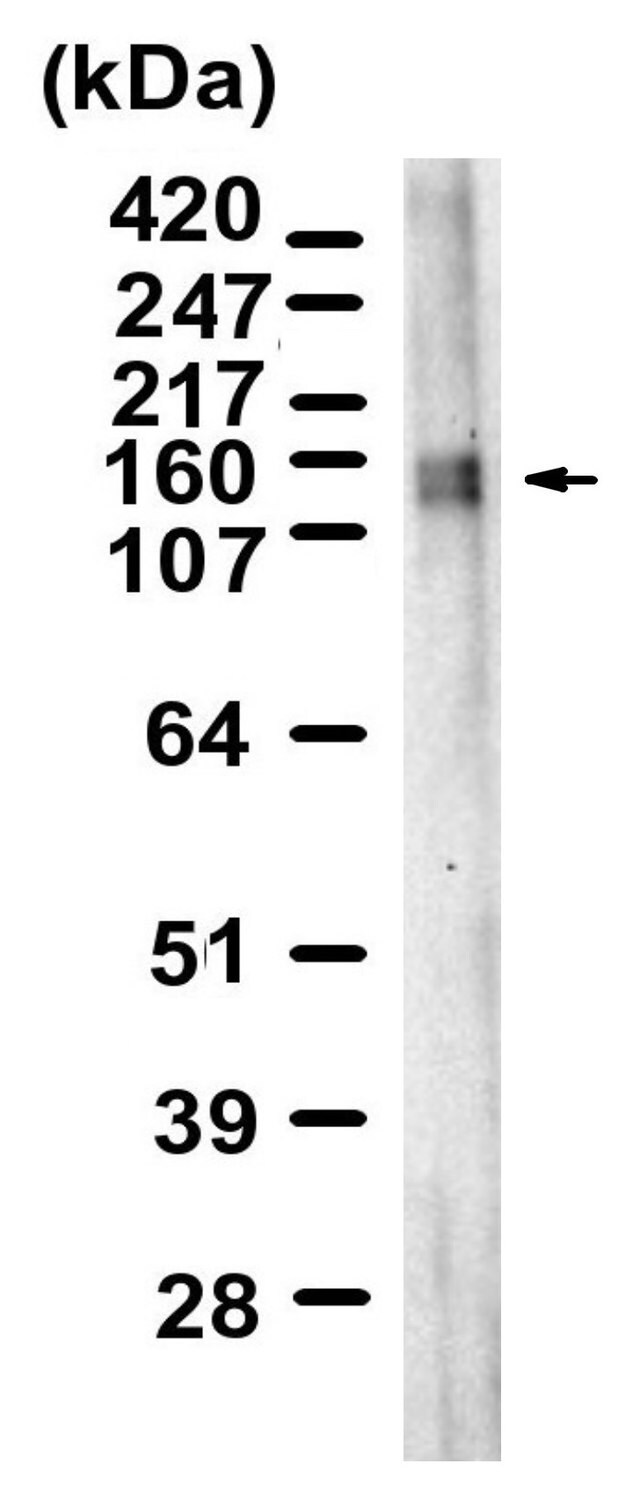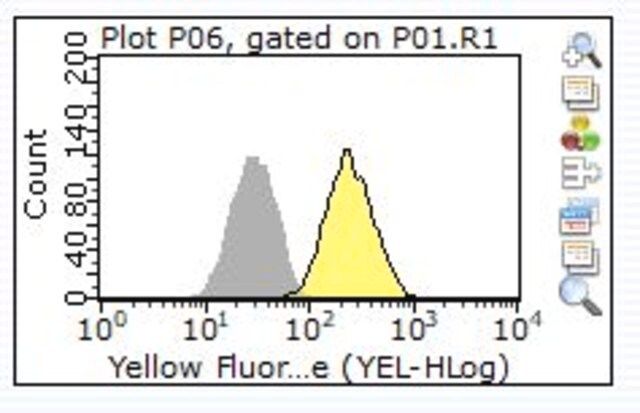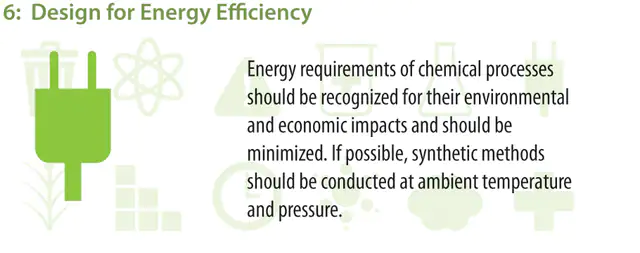您的位置:首页 > 产品中心 > Anti-ACAD10 Antibody, clone 3J20 ZooMAb® Rabbit Monoclonal
Anti-ACAD10 Antibody, clone 3J20 ZooMAb® Rabbit Monoclonal
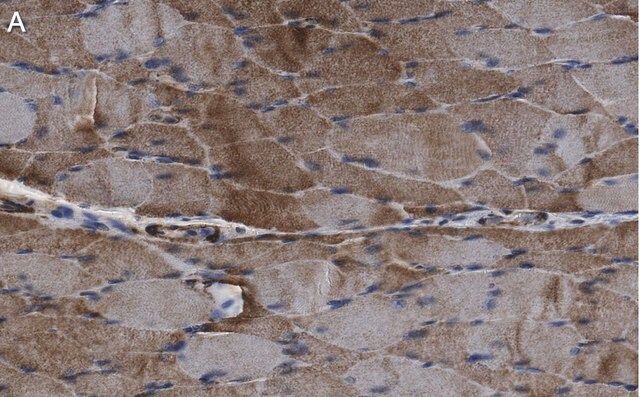


| 产品编号: | 4082713 |
| 规格: | recombinant, expressed in HEK 293 cells |
| 包装规格: | 25 μL,4 X 25 μL |
| 产品类别: | 进口试剂 |
| 品牌: | Sigma-Aldrich |
| 优惠价: | 立即咨询 |
产品性质
| biological source【生物来源】 | rabbit |
| Quality Level【质量水平】 | 200 |
| recombinant【重组】 | expressed in HEK 293 cells |
| conjugate【偶联物】 | unconjugated |
| antibody form【抗体形式】 | purified antibody |
| antibody product type | primary antibodies |
| clone【克隆】 | 3J20, monoclonal recombinant monoclonal |
| product line【产品线】 | ZooMAb® learn more |
| form【形式】 | lyophilized |
| mol wt【分子量】 | calculated mol wt ~ 118.83 kDa observed mol wt ~ 130 kDa |
| species reactivity | human, rat |
| species reactivity (predicted by homology) | monkey |
| packaging【包装】 | antibody small pack of 25 μL |
| enhanced validation【增强验证】 | recombinant expression Learn more about Antibody Enhanced Validation |
| technique(s) | affinity binding assay: suitable flow cytometry: suitable immunohistochemistry (formalin-fixed, paraffin-embedded sections): suitable western blot: suitable |
| isotype【同位素/亚型】 | IgG |
| shipped in【运输】 | ambient |
| storage temp.【储存温度】 | 2-8℃ |
基本信息
| General description【一般描述】 | ZooMAb antibodies represent an entirely new generation of recombinant monoclonal antibodies. Each ZooMAb antibody is manufactured using our proprietary recombinant expression system, purified to homogeneity, and precisely dispensed to produce robust and highly reproducible lot-to-lot consistency. Only top-performing clones are released for use by researchers. Each antibody is validated for high specificity and affinity across multiple applications, including its most commonly used application. ZooMAb antibodies are reliably available and ready to ship when you need them. |
| Specificity【特异性】 | Clone 3J20 is a ZooMAb® rabbit recombinant monoclonal antibody that specifically detects Acyl-CoA dehydrogenase family member 10 (ACAD10). It targets an epitope within 18 amino acids from the C-terminal half. |
| Immunogen【免疫原】 | KLH-conjugated linear peptide corresponding to 18 amino acids from the C-terminal half of human Acyl-CoA dehydrogenase family member 10 (ACAD10). |
| Application【应用】 | Anti-ACAD10, clone 3J20 ZooMAb®, Cat. No. ZRB1828, is a recombinant Rabbit monoclonal antibody that specifically targets ACAD10 and is tested for use in Affinity Binding Assay, Flow Cytometry, Immunohistochemistry (Paraffin), and Western Blotting. Quality Control Testing Evaluated by Western Blotting in L6 cell lysate. Western Blotting Analysis: A 1:10,000 dilution of this antibody detected ACAD10 in L6 cell lysate. Tested Applications Affinity Binding Assay: A representative lot of this antibody bound ACAD10 peptide with a KD of 1.0 x 10-12 in an affinity binding assay. Flow Cytometry Analysis: 0.1 μg from a representative lot detected ACAD10 in one million L6 cells. Immunohistochemistry (Paraffin) Analysis: A 1:100 dilution from a representative lot detected ACAD10 in human skeletal muscle tissue sections. Note: Actual optimal working dilutions must be determined by end user as specimens, and experimental conditions may vary with the end user |
| Physical form【外形】 | Purified recombinant mouse monoclonal antibody IgG, lyophilized in PBS, 5% Trehalose, normal appearance a coarse or translucent resin. Contains no biocide or preservatives, such as azide, or any animal by-products. Larger pack sizes provided as multiples of 25 μL. |
| Reconstitution【重悬】 | 300 μg/mL after reconstitution at 25 μL per vial. Please refer to guidance on suggested starting dilutions and/or titers per application and sample type. |
| Legal Information【法律信息】 | ZooMAb is a registered trademark of Merck KGaA, Darmstadt, Germany |
产品说明
| Target description【目标描述】 | Acyl-CoA dehydrogenase family member 10 (UniProt: Q6JQN1; also known as ACAD-10) is encoded by the ACAD10 gene (Gene ID: 80724) in human. Acyl-CoA dehydrogenases (ACADs) are a family of flavoproteins that are involved in the beta-oxidation of the fatty acyl-CoA derivatives to generate acetyl CoA and reducing equivalents for generating energy. ACAD-10 is a widely expressed mitochondrial matrix enzyme. Its high expression has been reported in fetal brain. It is also highly expressed in liver, kidney, pancreas, and spleen. It contains a hydrolase domain at the N-terminal region, a serine/threonine protein kinase catalytic domain in the central region, and a conserved ACAD domain in the C-terminal region. It catalyzes the mitochondrial beta-oxidation of fatty acyl-CoA derivatives. Variations in ACAD10 gene have been linked to increased susceptibility to Type II diabetes, which may be mediated by impaired insulin sensitivity and abnormal lipid oxidation. Mice deficient in ACAD10 display abnormal glucose tolerance and elevated insulin levels. They accumulate excess abdominal fat, develop early liver inflammation, and have abnormal skeletal muscle mitochondria. This ZooMAb® recombinant monoclonal antibody, generated by our propriety technology, offers significantly enhanced specificity, affinity, reproducibility, and stability over conventional monoclonals. (Ref.: Bian, L., et al. (2010). Diabetologia. 53(7); 1349-1353; He, M., et al. (2011). Mol. Genet. Metab. 102(4); 418-429; Bloom, K., et al., (2017). J. Inhert. Metab. Dis. 41(1); 49-57). |
| Storage and Stability【储存及稳定性】 | Recommend storage of lyophilized product at 2-8℃; Before reconstitution, micro-centrifuge vials briefly to spin down material to bottom of the vial; Reconstitute each vial by adding 25 μL of filtered lab grade water or PBS; Reconstituted antibodies can be stored at 2-8℃, or -20℃ for long term storage. Avoid repeated freeze-thaws. |
| Disclaimer【免责声明】 | Unless otherwise stated in our catalog or other company documentation accompanying the product(s), our products are intended for research use only and are not to be used for any other purpose, which includes but is not limited to, unauthorized commercial uses, in vitro diagnostic uses, ex vivo or in vivo therapeutic uses or any type of consumption or application to humans or animals. |
安全信息
| Storage Class Code【储存分类代码】 | 11 - Combustible Solids |
| WGK | WGK 1 |





